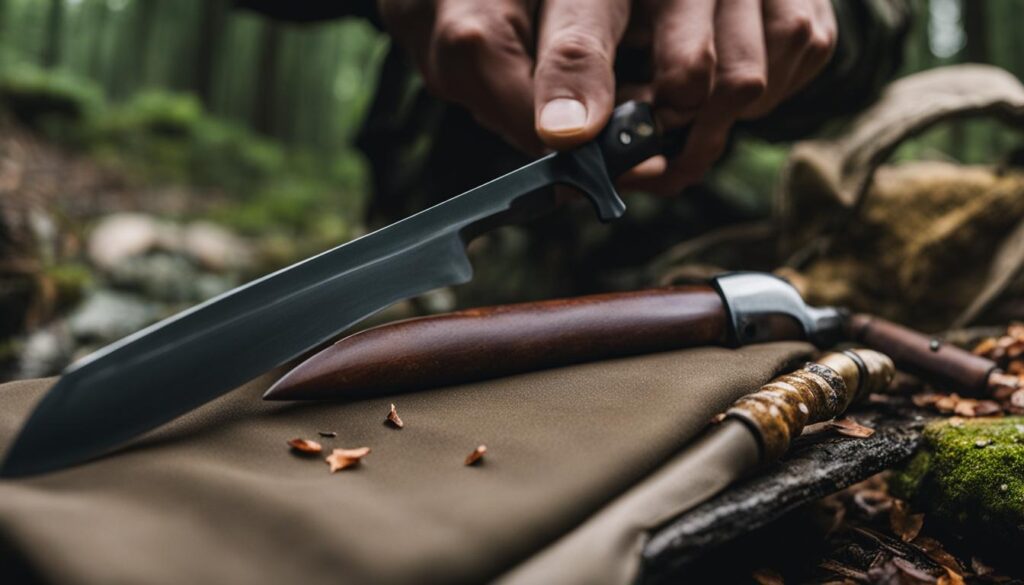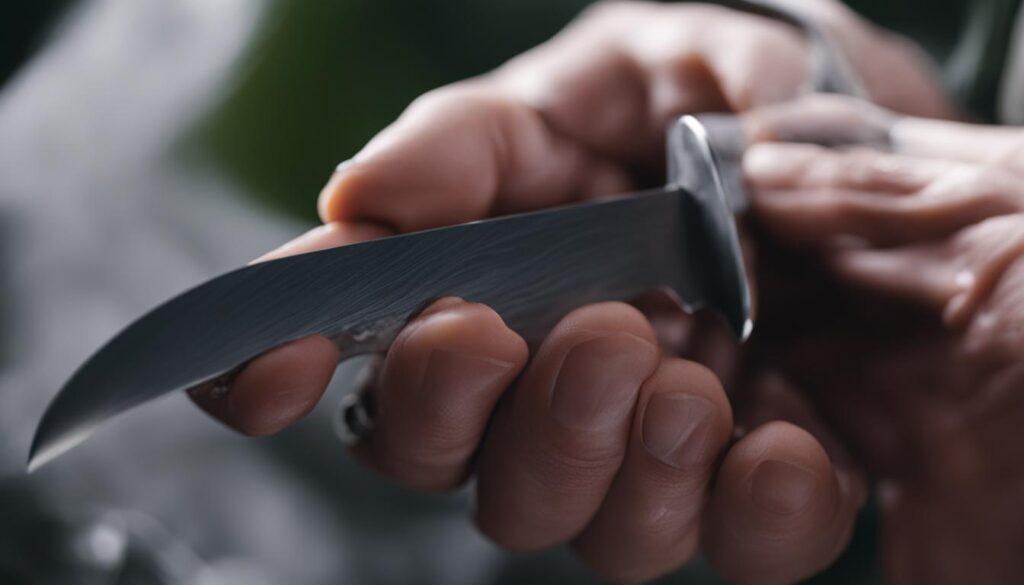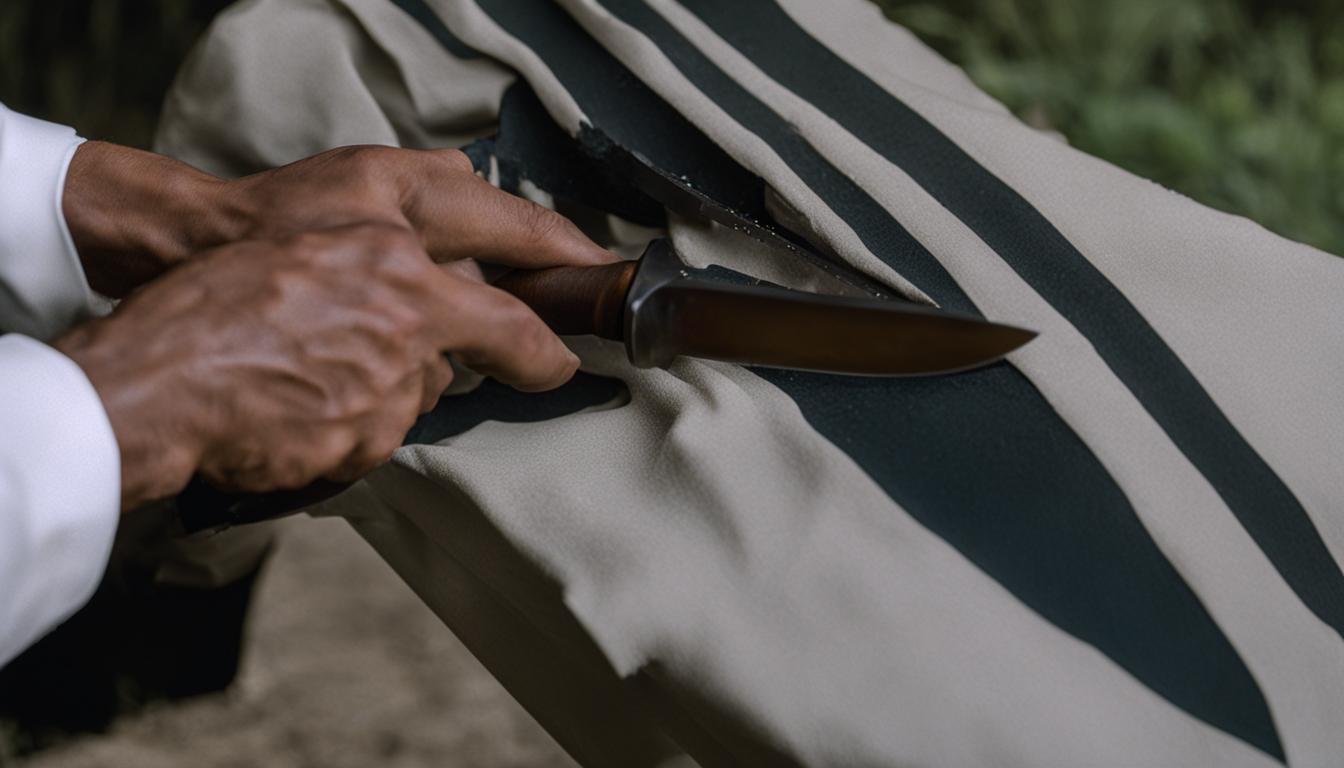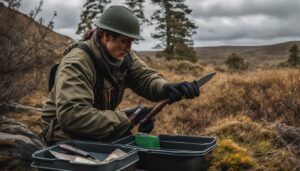Greetings, fellow hunting enthusiasts! Today, I want to talk to you about a topic that often gets overlooked but is vital for the performance and longevity of your hunting knives: safe knife cleaning methods. Hunting knives are essential tools for field dressing and butchering, and neglecting their maintenance can lead to subpar performance and potential safety hazards. By following proper knife care techniques, you can ensure that your hunting knives remain in top condition, ready for whatever challenges the wilderness throws your way.
The Importance of Sharpness and When to Sharpen Your Knife
Maintaining a sharp edge on your hunting knife is crucial for both safety and performance. A dull knife not only increases the risk of accidents but also makes cutting tasks more difficult and time-consuming. It is recommended to regularly inspect and touch up the blade before it becomes too dull. Testing the sharpness can be done by cutting a piece of paper or checking if the knife can shave arm hair with ease.
Once you notice a decrease in cutting performance, it is time to sharpen your knife. There are various sharpening tools available, such as sharpening stones or handheld gadgets, that can help restore the edge. It is important to follow the manufacturer’s instructions or seek guidance from experts to ensure proper sharpening techniques.
| Signs Your Knife Needs Sharpening |
|---|
| The blade struggles to cut through materials easily. |
| The edge has become noticeably dull or rounded. |
| Cuts are no longer clean and precise. |
| The knife slips while cutting. |
| The blade catches or snags on the material being cut. |
Preventive maintenance is key when it comes to knife sharpening. Regularly honing the blade to maintain its sharpness will not only enhance your cutting experience but also prolong the life of your hunting knife. By staying proactive and sharpening your knife as needed, you can ensure optimal performance in the field.
Quote:
“A sharp knife is not only safer, but it also allows you to make clean, precise cuts without exerting unnecessary force. Regularly sharpening your hunting knife will ensure you’re always prepared for any cutting task.”
Remember, a sharp knife is a reliable tool that enables efficient and safe cutting. Don’t wait until your knife becomes dull and ineffective before taking action. Stay vigilant and sharpen your hunting knife regularly to maintain its cutting edge and maximize performance during your outdoor adventures.
Proper Field Care and Cleaning
Proper field care and cleaning are crucial for maintaining the performance and longevity of your hunting knife. After each use, it is important to clean your knife to remove debris and prevent corrosion. A dirty knife not only hampers its cutting ability but also increases the risk of rusting and damage to the blade.
In the field, wiping down the knife with a damp cloth or rinsing it with water or snow is sufficient to remove dirt and bloodstains. However, avoid using harsh detergents or chemicals as they can damage the blade’s finish. It’s important to remember that a hunting knife is an essential tool, and proper cleaning should be a part of your field routine.
For a more thorough cleaning, a mild solvent can be used. Soaking the blade in a cleaning solution for a short time can help to dissolve stubborn stains or buildup. Afterward, make sure to dry the knife thoroughly to prevent any moisture from causing rust or corroding the blade.
| Cleaning Solvent | Instructions |
|---|---|
| Mild dish soap solution | Mix a small amount of dish soap with warm water. Soak the blade for a few minutes, then scrub gently with a soft-bristled brush. Rinse thoroughly and dry. |
| Isopropyl alcohol | Dampen a cloth or cotton swab with isopropyl alcohol and wipe the blade thoroughly. Pay special attention to any areas with stubborn stains. Dry the knife completely. |
| White vinegar | Create a mixture of equal parts white vinegar and water. Soak the blade for a few minutes, then scrub with a soft brush. Rinse well and dry immediately. |
It is also recommended to apply a thin coat of oil to the blade when not in use to protect it from moisture and corrosion. A light mineral oil or specially formulated knife oil can help create a barrier against environmental factors. Remember to wipe off any excess oil before using the knife to avoid residue buildup.
Proper field care also involves keeping the hunting knife sheathed when not in use. This protects the edge from accidental damage and keeps the knife secure. Additionally, inspect your knife regularly for any signs of wear or damage. This includes checking the handle for any loose fittings or cracks. Taking proactive measures will ensure that your hunting knife remains in optimal condition for years to come.

Key Tips for Knife Maintenance
Proper maintenance is essential for keeping your hunting knife in optimal condition. By following these key tips, you can ensure safe knife handling, extend the lifespan of your knife, and maintain its cutting performance.
Safe Knife Handling
Using a hunting knife requires caution and care to prevent accidents. Always remember the following safe knife handling practices:
- Never leave your knife unattended or within reach of children or inexperienced individuals.
- Always handle your knife with a firm grip and avoid excessive force when cutting or slicing.
- When passing the knife to someone else, hand it over with the handle first and the blade closed or covered.
- Never use your knife for purposes other than its intended use, such as prying or using it as a screwdriver.
- Always store your knife in a sheath or a secure case when not in use to protect both the blade and yourself.
Knife Lubrication
Proper lubrication is crucial for preventing rust, corrosion, and maintaining smooth blade operation. Here are some knife lubrication tips:
- Before applying any lubricant, make sure your knife is clean and dry.
- Use a high-quality knife oil or lubricant specifically designed for blades.
- Apply a small amount of oil to the blade, pivot point, and any other moving parts of the knife.
- Distribute the oil evenly using a clean cloth or a cotton swab.
- Wipe off any excess oil to avoid attracting dirt or debris.
Regular Inspection and Maintenance
Regularly inspecting your knife and performing maintenance tasks can help identify issues early on and prevent further damage. Here are some maintenance tips:
- Check the tightness of screws, pivot points, and other fasteners regularly. If they are loose, tighten them carefully.
- Inspect the blade for any signs of wear, chips, or cracks. If you notice any damage, contact a professional for repair or replacement.
- Keep the edge sharp by regularly honing or sharpening the blade using appropriate sharpening tools.
- If your knife has a folding mechanism, clean it regularly to remove any dirt or debris that might affect its functionality.


By following these key tips for knife maintenance, you can ensure safe and efficient use of your hunting knife for years to come. Remember to handle your knife with care, keep it properly lubricated, and perform regular inspections and maintenance tasks. Taking the time to properly maintain your knife will not only extend its lifespan but also enhance your overall hunting experience.
Care for Custom Hunting Knives
Custom hunting knives are meticulously handcrafted pieces that require special care to preserve their functionality and beauty. By following these knife care tips, you can ensure that your custom hunting knife maintains its durability and performance for years to come.
Proper Cleaning
Regular cleaning is essential to remove dirt, grime, and moisture that can cause damage to the blade and handle of your custom hunting knife. Use a non-abrasive cloth to gently wipe the knife after each use. Avoid using strong cleaning substances that can potentially harm the blade’s finish or handle materials.
Sharpening Techniques
Sharpen your custom hunting knife only when necessary, as excessive sharpening can reduce the lifespan of the blade. Use appropriate sharpening methods such as sharpening stones or guided sharpening systems to maintain the knife’s edge. Take your time and follow the manufacturer’s recommendations to ensure the best results.
Handle Care
Handle materials like wood or bone require special attention to prevent cracking, warping, or discoloration. Keep your custom hunting knife in a dry environment to avoid moisture seeping into the handle and causing damage. Apply a thin coat of oil to the handle periodically to protect it from drying out or cracking.
Proper care and maintenance are vital to preserve the quality and longevity of your custom hunting knife. By following these knife care tips, you can enjoy the functional and aesthetic value of your unique piece of art for generations to come.
| Custom Hunting Knives | Knife Care Tips | Hand Finished Knives |
|---|---|---|
| Requires special care | Regular cleaning with non-abrasive cloth | Preserves functionality and beauty |
| Avoid exposure to moisture | Sharpen only when necessary | Maintains durability and performance |
| Handle materials require attention | Use appropriate sharpening methods | Prevents cracking and warping |
The Arno Bernard Knife Care Guide
Arno Bernard Knives are renowned for their craftsmanship and quality. Made from fine-grained steel, these knives require regular maintenance to ensure optimal performance and longevity. Proper cleaning, sharpening, and lubrication are essential steps in caring for your Arno Bernard knife.
After each use, it is important to clean your knife thoroughly. Use a non-abrasive cloth to remove any dirt or debris from the blade. Avoid using harsh chemicals or abrasive materials that could damage the knife’s finish. Regular cleaning will help maintain the knife’s appearance and prevent the buildup of grime.
Sharpening your Arno Bernard knife is crucial for maintaining its sharpness and cutting performance. You can use a Warthog sharpener or a sharpening stone to restore the blade’s edge. It is recommended to sharpen the knife as soon as you notice a decrease in cutting performance, such as difficulty in slicing or dulling of the edge. By keeping the knife sharp, you ensure clean, precise cuts every time.
Lubrication is another important aspect of knife care. Applying a small amount of oil to the blade helps prevent rust and corrosion. Use a clean cloth to apply the oil evenly, making sure to cover the entire blade. This step is particularly important if you live in a humid or coastal area where moisture is prevalent. Regular lubrication will keep your Arno Bernard knife in optimal condition for years to come.
Arno Bernard Knife Care Tips:
- Clean your knife after each use with a non-abrasive cloth
- Sharpen the blade as needed using a Warthog sharpener or sharpening stone
- Apply a small amount of oil to the blade for rust prevention
Conclusion
Proper knife cleaning and maintenance are essential for keeping your hunting knives in top condition. By following these safe knife cleaning methods and best practices, you can ensure that your knives remain sharp, durable, and safe to use.
Regular cleaning is the first step in maintaining your knife. After each use, make sure to remove any debris or residue by wiping the blade with a clean cloth. This helps prevent corrosion and extends the lifespan of your knife.
Sharpening your knife is another crucial aspect of maintenance. Keep an eye out for signs of dullness, such as difficulty cutting or tearing of paper. When necessary, use the appropriate sharpening tools, such as sharpening stones or handheld gadgets, to restore the edge of your knife.
Lubrication is also important for preventing rust and corrosion. Apply a small amount of oil to the blade, especially when storing your knife for extended periods. This helps protect the metal and ensures smooth operation.
In conclusion, by incorporating these knife cleaning tips and maintenance best practices into your routine, you can prolong the life of your hunting knives and enjoy a better cutting experience. Remember to clean, sharpen, and lubricate your knives regularly to maintain their optimal performance and ensure your safety in the field.
FAQ
Why is it important to regularly maintain hunting knives?
Regular maintenance ensures optimal performance and safety while using hunting knives. Neglecting proper care can result in difficulties during field dressing and butchering, as well as improper processing of game meat.
How can I test the sharpness of my hunting knife?
You can test the sharpness of your knife by cutting paper or seeing if the knife shaves arm hair. It is recommended to touch up or hone your blade frequently before it becomes too dull.
What tools can I use to sharpen my hunting knife?
Sharpening tools such as sharpening stones or handheld gadgets can be used to sharpen hunting knives. It is best to sharpen your knife as soon as you notice a decrease in cutting performance.
How should I clean my hunting knife after each use?
In the field, wiping it down with wet grass or rinsing with water or snow is sufficient. Later, a mild solvent can be used for thorough cleaning. It is also recommended to apply a thin coat of oil to the blade when not in use to protect it.
What are key tips for knife maintenance?
Keeping your knife clean by wiping it down regularly and avoiding prolonged immersion in liquids or strong cleaning substances is essential. Additionally, keeping the knife dry and lubricated with a small amount of oil helps prevent rust and corrosion.
How should I care for custom hunting knives?
Custom hunting knives require special care. Regular cleaning with a non-abrasive cloth and avoiding exposure to moisture are important. Sharpening should be done only when needed using appropriate methods, and lubrication with oil is recommended. Caring for handle materials, such as wood or bone, is also crucial.
How should I care for Arno Bernard knives?
Arno Bernard Knives are known for their craftsmanship and quality. Regular cleaning with non-abrasive materials, sharpening with a Warthog sharpener or sharpening stone, and lubrication with oil are recommended for Arno Bernard knives.





